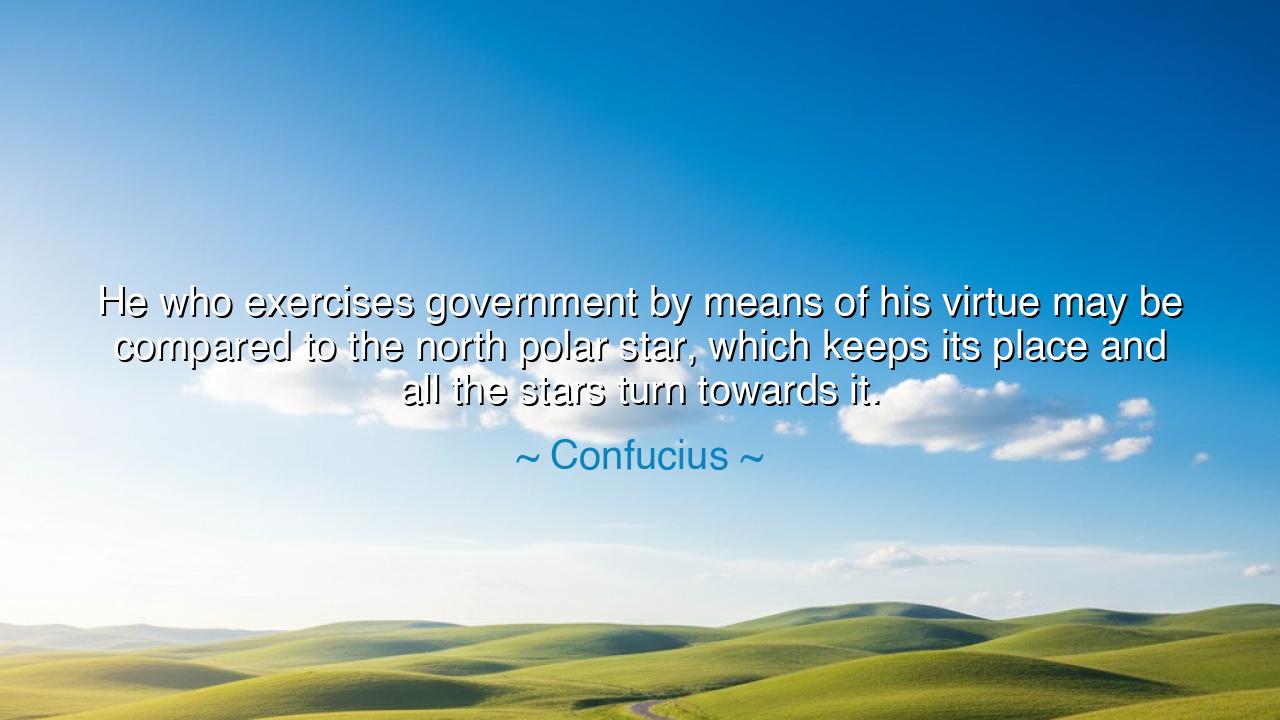
He who exercises government by means of his virtue may be
He who exercises government by means of his virtue may be compared to the north polar star, which keeps its place and all the stars turn towards it.






"He who exercises government by means of his virtue may be compared to the north polar star, which keeps its place and all the stars turn towards it." – Confucius
In these luminous words, Confucius, the great sage of the East, reveals the timeless foundation of just leadership: virtue as the compass of governance. His metaphor of the north polar star—fixed, radiant, and steadfast—speaks to the heart of moral authority. For Confucius, true power does not arise from fear or law alone, but from the irresistible gravity of virtue. A ruler who governs through integrity and righteousness becomes like that eternal star in the heavens—immovable and constant—around which all others naturally turn. In such harmony, order is not enforced; it is inspired.
The origin of this teaching lies in The Analects, the sacred record of Confucius’s conversations with his disciples more than 2,500 years ago. In an age when China was torn by corruption, war, and the decay of ancient rites, Confucius sought to restore harmony not through conquest but through character. He taught that a ruler’s moral example, like a shining light, brings alignment to the realm without the need for punishment or coercion. “The virtuous man governs by his example; the inferior man governs by his commands,” he declared elsewhere. This belief formed the cornerstone of Confucian philosophy—that ethical leadership, not brute authority, is the source of lasting peace.
To understand the depth of his words, one must grasp the meaning of the north polar star in ancient Chinese cosmology. It was the one point in the sky that did not move, even as the heavens revolved around it. To the ancients, it symbolized the Emperor, the Son of Heaven—steady, unmoved, and guiding all beneath the celestial sphere. When Confucius compared the virtuous ruler to that star, he was not speaking of astrology, but of moral gravity. The truly good ruler does not need to chase loyalty or obedience; his virtue commands it naturally. As the stars orient themselves to the pole, so too do people align their hearts to one who leads with justice, humility, and wisdom.
History offers shining examples of this truth. Consider Emperor Ashoka of India, who, after years of conquest, was haunted by the suffering he caused. He turned to the teachings of the Buddha and ruled thereafter with compassion and fairness, abolishing needless wars, building hospitals, and planting trees for travelers. His empire flourished not through force, but through the moral magnetism of his virtue. Like the polar star, Ashoka’s integrity became the fixed point around which millions found guidance and peace. His rule remains, to this day, a living testament to Confucius’s wisdom: that virtue radiates more powerfully than violence ever can.
In contrast, the world has seen rulers who tried to govern through fear—tyrants who mistook control for strength. They rose swiftly and fell violently, for their rule lacked the constancy of virtue. Fear fades, deception crumbles, and cruelty breeds rebellion. But virtue endures. The ruler who leads with compassion and justice engraves his legacy not upon monuments, but upon the hearts of his people. Confucius’s polar star is thus a mirror of moral law itself: steady, unchanging, and eternal, guiding the wise and the humble alike through the chaos of human ambition.
Beyond the throne, Confucius’s teaching extends to every realm of life. A parent, a teacher, a leader, a friend—all who hold influence must understand that authority without virtue is hollow. One may command obedience, but never respect; one may inspire fear, but never loyalty. The true leader does not push others into alignment; he draws them through the radiance of his example. This is the essence of moral leadership—to rule one’s own heart first, so that others may find their way by its light.
The lesson, then, is clear: seek not to control, but to embody. Power that comes from virtue is the only power that lasts. The man or woman who cultivates honesty, courage, and compassion becomes a fixed point of truth in a world that wavers. They lead not through noise or command, but through quiet steadfastness—the same way the polar star leads the stars through its silent constancy.
And so, the practical actions are these: master yourself before you master others. Let your integrity speak louder than your ambition. Govern your words, your deeds, and your thoughts with justice and humility. Strive to be the fixed point in your family, your community, your nation—a light that others can look to when the skies grow dark. For as Confucius teaches, the ruler who governs by virtue needs no crown to command respect, just as the polar star needs no voice to guide the heavens. Its place is secure, its presence eternal, and all who seek truth naturally turn toward its light.






AAdministratorAdministrator
Welcome, honored guests. Please leave a comment, we will respond soon